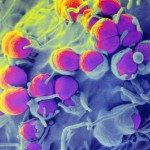Link to Pubmed [PMID] – 12663436
Blood 2003 Jul;102(2):585-91
We investigated whether a developmental immaturity of the dendritic cells (DCs) compartment could contribute to the high susceptibility to infections observed in newborns. DCs are among the first cells to colonize the spleen, but the ontogeny of DC subsets follows distinct steps. At birth, plasmacytoid DCs and CD4-CD8alpha- DCs are found in the spleen, whereas CD8alpha+ and CD4+ DCs are not present. Then, the CD8alpha+ DC compartment quickly develops and reaches an adult size by day 7, whereas the CD4+ DC compartment slowly increases to become predominant by the age of 3 weeks. The production of interleukin (IL)-12p70 by DCs is particularly efficient after birth, reflecting the stronger capacity of the neonatal CD8alpha- DCs to secrete IL-12 compared with its adult counterpart. Like-wise, neonatal DCs produced type I and II interferons. In vivo, following microbial stimulation, up-regulation of major histocompatibility complexes (MHCs) and of costimulatory molecules on DCs was induced clearly showing the activation of neonatal DCs in the neonatal environment. Therefore, despite a markedly different DC subset composition in early life compared with the adult DC compartment, neonatal DCs are fully competent in their innate immune functions.



